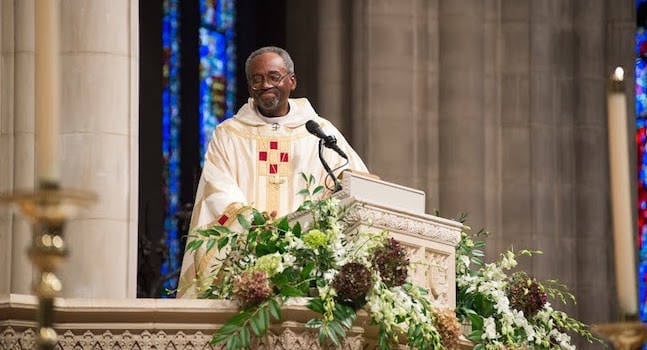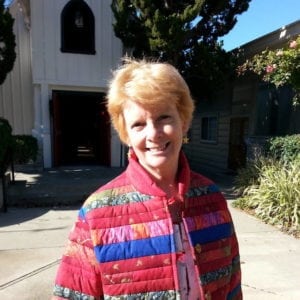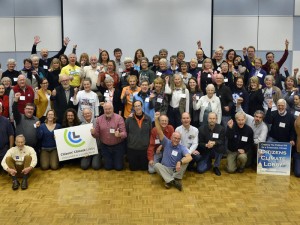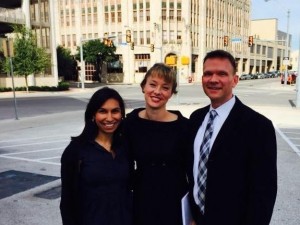
Michael Bruce Curry is the 27th Presiding Bishop of The Episcopal Church, which will consider a carbon pricing resolution at this summer’s General Convention. Photo by Danielle Thomas.
Episcopal Church considers resolution in support of carbon pricing
By Philip Finkelstein
The Episcopal Church in San Francisco and the Contra Costa CCL chapter have recently joined forces on a holy crusade to mitigate the effects of climate change through support of a Carbon Fee & Dividend (CF&D) resolution. Having garnered widespread interest in the religious circuit and several endorsements across the state of California, the CF&D resolution now has a chance to expand to the church’s national level as it has been approved for the agenda at the 79th General Convention of the Episcopal Church in Austin, Texas, this July. Behind this exciting endeavor is retired public affairs officer, Emily Hopkins; this is her story.

Emily Hopkins
After learning about CCL at an Earth Day event at a local church in April 2016, Emily became increasingly concerned about the effects of the climate crisis. Although she had never been politically active, she felt this was a matter worth getting involved. Despite some negative connotations she had with the word “lobbying,” she looked into CCL and ultimately decided to become a citizen lobbyist. She took online training and attended Congressional Education Days in Washington, D.C., after the November 2016 elections. Using the CCL approach, she found herself becoming increasingly energized, and this sense of empowerment—using the political system as it was intended, guided by experts in policy and science—drove her ambitions further as her perception of politics and lobbying shifted.
The same week she returned from D.C., Emily attended a meeting for the 16 local Episcopal parish churches (organized into a Deanery) to speak about her CCL experiences and introduce CF&D. There was real interest in learning more among attendees, which evolved into taking CF&D as a resolution to the Bay Area convention. Thus began a year-long process within the organization of the Episcopal system—a system resembling “a microcosm of the American government,” according to Emily.
With help from several mentors who had experience in shepherding resolutions for the Episcopal Church, Emily traveled across county lines to meetings in other Deaneries, presented the CF&D proposal, and engaged local churchgoers. To help preach the gospel of climate change, she developed a page of FAQs using the CCL Community and her local CCL chapter as resources. To build support, Emily reached out to several Bay Area clergy for their endorsements, finding some success. However, the renowned environmentalist, Rev. Sally Bingham, founder and CEO of Interfaith Power & Light, declined to endorse CF&D due to her predilection toward the California cap and trade system.
Nevertheless, Emily stayed motivated, crafting the resolution with support from her local clergy and laity. All coming to fruition, the CF&D resolution was introduced to the 168th convention of the Episcopal Diocese of California in San Francisco, and after minor debate, was approved and certified on October 27, 2017. This is a huge win for the CCL agenda given the breadth of the Diocese, which comprises 24,000 people and 82 congregations throughout the Bay Area. Emily was pleased with the adopted resolution, which submits “That the 79th General Convention of The Episcopal Church support a national tax on carbon-based fossil fuels based on the Carbon Fee and Dividend proposal of the Citizens’ Climate Lobby.”
The work continues as preparations are made for the General Convention, but there is a lot of promise for national support. When asked about her church’s perspective on climate change, Emily said, “The Episcopal Church is a powerful witness for addressing the care of our environment at the local, national, and international level. Our General Convention policy calls on lawmakers to significantly reduce carbon emissions within this century, to promote renewable energy technologies, and to financially support developing nations as they transition away from fossil fuels.” If this sentiment is carried forward in July, then the resolution may very well spread support for CF&D to churches in all 50 states. As Episcopalians are grounded in the beliefs set out by their church, Emily explains, they can be influential advocates for environmental policy and a driving force for change in environmental justice.
Emily will be traveling to Austin to support her delegation alongside her Bishop Marc Handley Andrus—an influential environmentalist and General Convention committee member—thus ensuring that the CF&D resolution is in good hands. Currently, she is in conversation about the convention with Sarah Braik of the Portland, Maine, CCL chapter, who is working to gather support from the Northeast Dioceses. And with plans to follow up with other CCLers and Episcopalians across the nation in an attempt to orchestrate a coalition, Emily believes, “CF&D could be passed and embraced by the Episcopal Church.”
For this to become a reality would mean potential CCL and CF&D policy exposure to the 77 million-member Anglican Communion represented in the United States by the Episcopal Church. This would be an impressive feat, but Emily’s aspirations transcend denomination or religion, proclaiming that care for the environment should extend to people of all faiths: “To be a witness and advocate for climate solutions is to live our faith.”
Update: On Day 7 of Convention, July 13, 2018, the Episcopal Church passed the carbon tax resolution on the consent agenda, with 842 “yes” votes.
Related Content:



